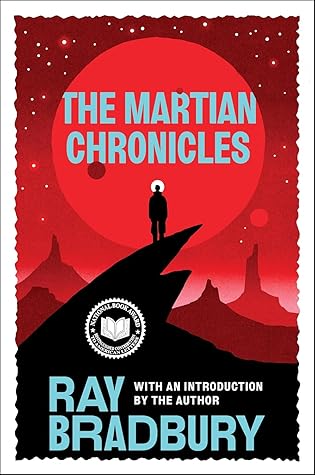More on this book
Community
Kindle Notes & Highlights
There’d be time for that later; time to throw condensed-milk cans in the proud Martian canals; time for copies of the New York Times to blow and caper and rustle across the lone gray Martian sea bottoms; time for banana peels and picnic papers in the fluted, delicate ruins of the old Martian valley towns. Plenty of time for that. And he gave a small inward shiver at the thought.
They knew how to blend art into their living. It’s always been a thing apart for Americans. Art was something you kept in the crazy son’s room upstairs. Art was something you took in Sunday doses, mixed with religion, perhaps. Well, these Martians have art and religion and everything.”
Oh, don’t look so terribly shocked, please. The Lord is not serious. In fact, it is a little hard to know just what else He is except loving. And love has to do with humor, doesn’t it? For you cannot love someone unless you put up with him, can you? And you cannot put up with someone constantly unless you can laugh at him. Isn’t that true? And certainly we are ridiculous little animals wallowing in the fudge bowl, and God must love us all the more because we appeal to his humor.”
“These men make it so hard,” said Leonora. “Used to be if a woman ran two hundred miles after a man it was something. Then they made it a thousand miles. And now they put a whole universe between us. But that can’t stop us, can it?”
For the first time they knew that their town was beautiful and the lonely lights and the ancient bricks beautiful, and they both felt their eyes grow large with the beauty of this feast they were giving themselves.
“Afraid of the word ‘politics’ (which again became a synonym for Communism among the more reactionary elements, so I hear, and it was worth your life to use the word!),
“For God’s sake, what are you doing?” shouted Garrett, rattling about. “I’m being ironic. Don’t interrupt a man in the midst of being ironic, it’s not polite. There!”
“He didn’t want us to feel badly. He told us it would happen one day and he didn’t want us to cry. He didn’t teach us how, you know. He didn’t want us to know. He said it was the worst thing that could happen to a man to know how to be lonely and know how to be sad and then to cry. So we’re not to know what crying is, or being sad.”
One of the things I love about Bradbury is how impatient he is with this line of thinking, and sees how dangerous it is: If someone thinks that the worst feeling is being sad, what might they justify doing to prevent themselves from ever feeling sad again?
“I was looking for Earthian logic, common sense, good government, peace, and responsibility.” “All that up there?” “No. I didn’t find it. It’s not there any more. Maybe it’ll never be there again. Maybe we fooled ourselves that it was ever there.”
Timothy looked too. But all he saw was a straight pencil line of canal going violet through a wide shallow valley penned by low, eroded hills, and on until it fell over the sky’s edge. And this canal went on and on, through cities that would have rattled like beetles in a dry skull if you shook them.
He just sat there, and the children were caught in the center of his awe and defeat and resignation and acceptance.
Life on Earth never settled down to doing anything very good. Science ran too far ahead of us too quickly, and the people got lost in a mechanical wilderness, like children making over pretty things, gadgets, helicopters, rockets; emphasizing the wrong items, emphasizing machines instead of how to run the machines. Wars got bigger and bigger and finally killed Earth.


